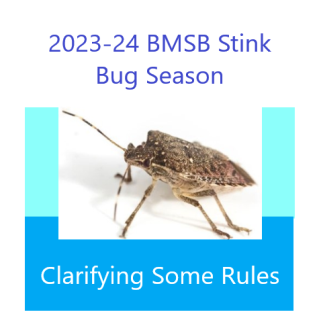Correspondence has come from the Department of Agriculture, Fisheries and Forestry (DAFF) this week that clarifies certain rules around Stink Bug (BMSB) treatment, including those covering transhipment, underbond movement, heat treatment for wood products, and more changes to the List of Approved Offshore Treatment Providers.
More Offshore Treatment Providers suspended.
DAFF has issued notice no.238-2023: “Offshore Brown Marmorated Stink Bug (BMSB) Treatment Providers Scheme: treatment providers suspended – Ensure Pest Control and Fumigation Pte Ltd (AEI: SG4010SB) and Fumigation Pest Management (AEI: SG4016SB).”
They have added those two to the growing number of fumigators who have been suspended to ensure biosecurity risk is managed. DAFF publishes a register of treatment providers on their website. They can direct any consignments treated by them including those in transit, for any action considered reasonable to manage the biosecurity risk posed. Consignments or goods are classified as ‘in transit’ when they have left the country of origin but have not yet been cleared through the border in Australia.
Clarification on Certain Rules
Industry representatives Freight & Trade Alliance (FTA) sought clarification from DAFF about a number of issues, two of which were explained as follows. (Source: FTA News).
The 120-hour Transhipping Window:
Where goods spend more than 120 hours transhipping in a target risk country, they require treatment for BMSB due to the risk of reinfestation or cross-contamination of the cargo in the port of transhipment.
Underbond Movement of Non-Compliant Cargo:
Even though the Australian Border Force (ABF) permits underbond movements to be lodged, this should not be utilised to move containers held for Biosecurity concerns, particularly if there is the potential for goods to be non-compliant with BMSB measures.
– Movement of these potentially non-compliant goods underbond to an Approved Arrangements (AA) does not exclude them from being subject to the measures, and any associated outcomes resulting from an unacceptable treatment.
– Movement of non-compliant BMSB break bulk cargo (including open top and flat rack containers), including movement via underbond, is not permitted. There are no provisions for this cargo type to be treated onshore for BMSB.
Canadian Heat-Treated Wood Products
DAFF has also issued notice no.239-2023: “Recognition of the Canadian Heat-Treated Wood Products Certification Program (HT Program) to manage BMSB.”
From 01 December 2023, DAFF will recognise that brown marmorated stink bug (BMSB) contamination is managed on consignments of sawn wood/timber that are produced through the Canadian Heat Treated Wood Products Certification (HT) Program between 01 December and 30 April each year.
This recognition means that the Seasonal BMSB Measures will not apply to sawn wood/timber produced through the HT Program and exported between these dates. These products will be subject to BMSB measures if produced and exported between 01 September – 30 November.
A ‘Heat Treatment Certificate for Exports to Australia,’ specific to the HT program, will be required to accompany these goods. For more details of the HT Program and certification requirements see DAFF’s IAN no. 239-2023 at this link.
Also see our related article: Preparing for the new Stink Bug Season.
For correct information about all your imports, including quarantine inspections and treatments, contact us here at Colless Young. As licensed Customs Brokers and International Freight Forwarders, we handle your cargo economically and professionally. Based in Brisbane, Colless Young provides a complete range of logistics services, including exports, both by sea and airfreight, at all major Australian ports and airports.

